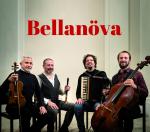

In the Apennine area known as the "Four Provinces" (AL, GE, PV, PC) there is a centuries-old tradition of dances, songs and ritual parties animated by the couple piffero (popular oboe) and accordion. Bellanöva ( Good News) is the result of the encounter between the Valla/Scurati couple and two classical performers, the cellist Nicola Segatta and the violinist and composer Marcello Fera. The two pairs of reed and bow instruments have merged into a single formation whose research concerns the lively and stimulating comparison between the dictate of the tradition and the individual inventiveness.
The good news (Bellanöva) is that music can be declined in a thousand different ways, as many men and human communities express it.
In the Apennine area known as the Four Provinces, where the provinces of Alessandria, Genoa, Pavia and Piacenza meet, is alive and still popular a centuries-old tradition of dances, songs, ritual festivals and calendarial rites. To animate this extraordinary corpus of music is the couple piffero (popular oboe) and accordion. Stefano Valla and Daniele Scurati are among the most qualified and famous performers of this repertoire.
Bellanöva (literally Good News) is the result of the encounter between the duo Valla/Scurati and two classical performers, the cellist Nicola Segatta and the violinist and composer Marcello Fera. The latter has covered the traditional repertoire with new voices for strings that surround and intersect it as if it were the texture of a fabric, and project it into a new expressive and communicative dimension. Thus it happened that the two pairs of reed and strings instruments merged into a single musical formation whose research concerns the lively and stimulating comparision between the dictate of the tradition and the individual inventiveness.
The good news (Bellanöva) is that music can be declined in a thousand different ways, as many as there are men and communities express it.
The encounter with the music of these two Valla-Scurati, a musical patrimony to which it belongs, has signified for me an enthusiastic discovery, even a sort of epiphany. This timbre of a piffero, a double reed musical intrument with a conical bore, reveals to an inner ear allowing it to be seduced. A vastness, with a continent of sound in its true guise. The fascination of this sound was multiplied by the variety of pronounciations with which it was used. This repertoire which has at its heart some pieces of music of truly archaic character, so original as to constitute an experience of unwarranted listening. The astonishment, along with the coupling of the accordion, resides in the two intruments with its apparently unreconcilable intonation that yet find in their praxis an unpredictable and seductive point of equilibrium. Everything happens with potent, savage energy, and the most touching melancholy, in this musical treasure which lives in the Apennine Mountains, between Liguria and the Po Valley.
The very impressive acuteness of first listening, which happened while I was without information as to what I was listening to, was subsequently followed by a trail that leads me here. The impulse of really embracing what you love is normal, it makes a mother into an antropophagous insight or a lover in odd metaphors and gestures. This is also what happens to composers like myself: it is to this amorous genre of desire, insigthful and emerging, to place my hand and thought into something perfectly autonomous.
To this corresponded another desire, that of Stefano and Daniele, to open new roads for their music, their very own style. Stefano and Daniele are this music, the so called Four Provinces (Alessandria in Piedmont; Genova in Liguria; Pavia in Lombardy; Piacenza in Emilia Romagna). They are in this very special, narrow sense, because such repertory lives directly through their flesh: those who apprehend it and trasmit it orally. Initially I intervened on the repertory of the two, adding a further two voices, for violin and violoncello. The two strings hence gave a voice to that which my hand added to the already existing music. The neatness of the initial approach then became much more tempered through a process articulated by protagonists and human relations shared along a considerable temporal archway.
Even the device which operated initially, of founding a unique name of a musical work making it composite and individual, signalled a path of confrontation and mediation between instances that involved us all: and here one must cite the pleasant support of Nicola Segatta, in a terrain of complete freedom and reciprocal faithfulness. The variety of types of intervention with which I have sought to operate through current musical pieces in this CD is part of this process. One goes from new writing, strange and in dialogue with the parts left intact by piffero and accordion, to a complete rewriting of these same intact pieces, with only the sole part of the piffero or of the voice. We find equally that my intervention was mimetical, neutral and that I have become a musical arranger of the piece.
Marcello Fera

Marcello Fera - violin, voice
Daniele Scurati - accordion, voice
Nicola Segatta - cello, voice
Stefano Valla - piffero, voice

Our Playlist
Our olaylist on Spotify, dedicated to P
re Minimalism, Minimalism and Post Minimalism.
© 2025 Felmay Srl - P.I. 06974300011 | Powered by: Riccardo Marino























